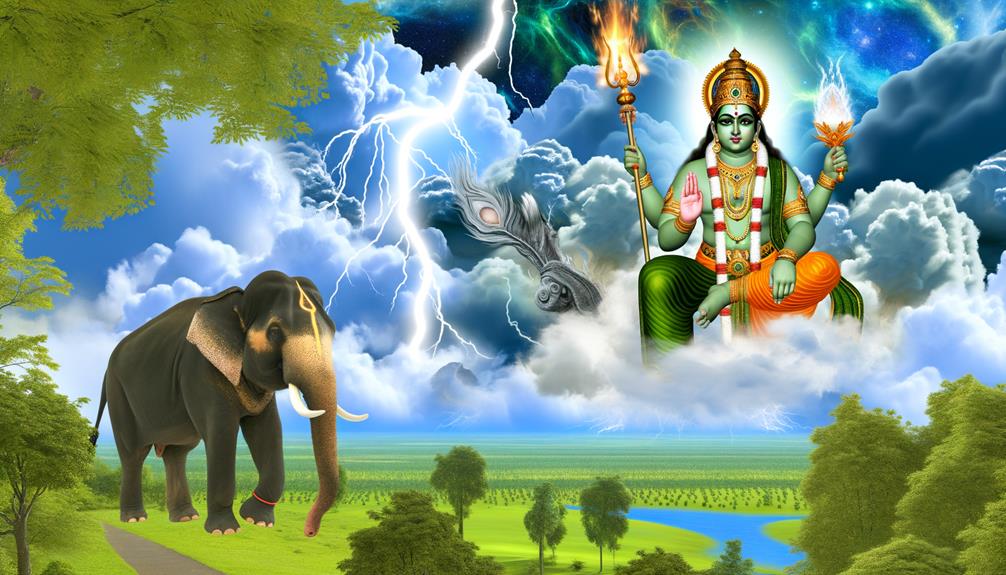Meaning of the Name Indra
Derived from ancient Indo-Aryan languages, the name 'Indra' emanates from the Sanskrit root 'ind,' signifying 'to possess' or 'to have power,' reflecting profound authority and dominion. In Hindu mythology, Indra is the formidable king of the Devas, embodying divine power, leadership, and cosmic order.
He commands thunder and rain, symbolizing both might and life-giving forces. This multifaceted deity is a dual representation of a warrior and beneficent god, embodying both protection and provision.
The name 'Indra' encapsulates a rich heritage of theological and cultural paradigms, offering a deeper understanding of its multifaceted implications. Continue to explore to unearth more layers of meaning.

Key Takeaways
- Indra means 'to possess' or 'to have power' from the Sanskrit root 'ind.'
- Indra is the king of gods and protector of cosmic order in Hindu mythology.
- Indra is associated with thunder, rain, and martial prowess.
- In Buddhism, Indra (Śakra) is a guardian deity protecting Buddha's teachings.
- Indra symbolizes divine authority, leadership, and the balance of cosmic order.
Etymological Origins
The name 'Indra' originates from ancient Indo-Aryan languages, specifically deriving from the Sanskrit root 'ind,' which means 'to possess' or 'to have power.'
This etymological foundation reflects a broader cultural and linguistic context where nomenclature often encapsulated societal values and roles. The root 'ind' suggests a figure of significant authority and influence, resonating with the linguistic patterns found in Vedic texts.
Source criticism reveals that early Indo-European languages share similar roots, indicating a common ancestral heritage. Interpretative narratives from historical linguistics propose that the term 'Indra' encapsulates not merely a name but a title denoting dominion and command.
This linguistic analysis underscores how language serves as a vessel for cultural and historical continuity.
Indra in Hindu Mythology
In Hindu mythology, Indra is depicted as the formidable king of the Devas, wielding authority over the heavens and the natural world. His dominion extends to the control of thunder and rain, symbolizing both his martial prowess and his role as a life-giver.
Scholarly interpretations often highlight Indra's duality as a warrior deity and a beneficent god, reflecting the complexities inherent in his mythological narratives.
King of Devas
Revered as the King of Devas, Indra occupies a central role in Hindu mythology, symbolizing authority, power, and the natural forces that govern the cosmos.
His dominion over the heavens and his position as the leader of the Devas underscore his significance within Vedic texts.
Scholars often interpret Indra's narrative as a reflection of the socio-political structures of ancient Indo-Aryan society, wherein kingship was paramount.
Critical examination of sources like the Rigveda reveals Indra's duality as a protector and a warrior, embodying both the benevolent and adversarial aspects of leadership.
This multifaceted portrayal offers insight into the complex interplay between divine authority and human governance, illustrating how mythological figures were used to mirror and legitimize contemporary hierarchies.
God of Thunder
Indra's characterization as the God of Thunder in Hindu mythology underscores his role as a formidable deity wielding control over meteorological phenomena, particularly storms and rain. This portrayal signifies his dominion over the natural elements, emphasizing his power and authority. The Rigveda frequently depicts Indra as a warrior god, vanquishing adversaries and causing thunderstorms to release life-giving rain. The thunderbolt, or *vajra*, is his iconic weapon, symbolizing his ability to harness and direct the forces of nature.
| Aspect | Description | Significance |
|---|---|---|
| Weapon | Vajra (Thunderbolt) | Control over storms |
| Role | Meteorological Deity | Power over natural elements |
| Depiction | Warrior God | Protector and provider |
| Textual Source | Rigveda | Ancient validation |
Through these elements, Indra's mythological identity as a weather god is thoroughly contextualized and validated.
Symbolism and Attributes
Indra's symbolism is deeply rooted in his role as the embodiment of divine power and authority. This is evident in numerous Vedic texts that describe him as the king of the gods. His attributes as the protector of cosmic order (Rta) further emphasize his significance in maintaining the balance between chaos and harmony in the universe.
Analyzing these characteristics reveals a complex portrayal of Indra, reflecting the theological and cosmological paradigms of ancient Hindu beliefs.
Divine Power and Authority
A closer examination of Indra's portrayal in Vedic texts reveals a multifaceted symbol of divine power and authority, characterized by his dominion over the elements and his role as the king of the gods.
Indra wields the thunderbolt (Vajra), embodying both the destructive and life-giving aspects of storms. His victories over cosmic adversaries, notably Vritra, signify his supreme power. Vedic hymns extol his unparalleled strength and valor, underscoring his authority within the divine hierarchy.
Scholars interpret these attributes as reflections of societal values placed on kingship and martial prowess. Indra's control over rain and fertility further cements his central role in agrarian societies, illustrating his indispensability in sustaining life and ensuring prosperity.
Protector of Cosmic Order
Beyond his role as a formidable deity of power and authority, Indra's significance extends to his function as the protector of cosmic order, an aspect richly illustrated through his symbolism and attributes in Vedic literature.
Indra's mighty thunderbolt (Vajra) signifies the destruction of chaos and maintenance of cosmic harmony. His association with rain and storms underscores his role in sustaining life and ensuring fertility. Additionally, his battles with the serpentine demon Vritra, who represents drought and chaos, epitomize his duty to preserve order.
- Vajra (Thunderbolt): Symbol of absolute power and righteousness.
- Rain and Storms: Elements of life and fertility.
- Vritra's Defeat: Triumph of order over chaos.
Through these symbols, Indra embodies the essential guardian of cosmic equilibrium.
Cultural References
Within various cultural narratives, the name Indra frequently appears as a symbol of power and authority, particularly in ancient Vedic traditions. Indra's depiction as the king of the gods in Rigvedic hymns underscores his significance in maintaining cosmic order and combating chaotic forces.
The Vedas, considered primary sources, elevate Indra's status by associating him with thunder and rain, essential elements for agrarian societies. Interpretative narratives suggest that Indra's prominence reflects societal values of leadership and protection.
Moreover, cross-cultural examinations reveal that similar deities in Indo-European mythologies, such as Zeus in Greek culture, share analogous attributes with Indra, indicating potential historical and cultural exchanges. This comparative analysis enriches our understanding of Indra's multifaceted role in ancient traditions.
Indra in Literature
Frequently celebrated in both ancient and contemporary literary works, Indra's character serves as a pivotal archetype embodying themes of heroism, divine authority, and moral complexity. In the Rigveda, Indra's valor and leadership during battles against cosmic chaos underscore his role as a protector.
Sanskrit epics such as the Mahabharata further depict his multifaceted nature, balancing divine duties with personal flaws. Modern adaptations continue to explore Indra's layered persona, reflecting societal values and existential queries.
- Inspiration: Indra's heroism ignites a sense of courage and resilience.
- Reflection: His moral struggles mirror our own ethical dilemmas.
- Legacy: The enduring presence of Indra in literature highlights timeless human concerns.
Through these narratives, Indra remains an enduring symbol of complex divinity.
Modern Usage
In contemporary contexts, the name Indra finds its relevance not only in cultural and religious dialogues but also in various modern media and corporate branding, reflecting its enduring symbolic potency. The name often appears in literature, cinema, and other entertainment forms, signifying strength and leadership. Additionally, companies in technology and innovation sectors frequently adopt the name to invoke a sense of power and cutting-edge capability. This modern usage underscores both continuity and adaptation of ancient symbolism in today's globalized world.
| Usage Context | Example |
|---|---|
| Literature | Protagonist names in novels |
| Cinema | Characters in films and series |
| Corporate Branding | Technology firms |
| Media | News outlets and publications |
Variations Across Cultures
While the modern usage of the name Indra demonstrates its adaptability in contemporary contexts, its variations across different cultures reveal a rich tapestry of interpretations and significances.
Historically, Indra has been revered in multiple traditions, each offering unique perspectives.
- Hinduism: Indra is celebrated as the king of gods, wielding thunderbolts and ruling over the heavens.
- Buddhism: Indra, or Śakra, appears as a guardian deity who protects the teachings of Buddha and safeguards cosmic order.
- Jainism: Indra is revered as a protective figure who presides over celestial beings and supports spiritual practices.
These diverse cultural contexts highlight how Indra's name and attributes have been adapted to align with varying spiritual, mythological, and philosophical frameworks, showcasing its profound cultural resonance.
Namesakes and Famous Figures
The name Indra has been borne by numerous influential figures throughout history, each contributing to its enduring legacy in various cultural and intellectual arenas. In Hindu mythology, Indra is hailed as the king of the gods, symbolizing power and leadership.
Modern namesakes include Indra Nooyi, the former CEO of PepsiCo, whose strategic vision transformed the global corporation. Additionally, Indra Lesmana, a celebrated Indonesian jazz musician, demonstrates the name's resonance in artistic circles.
Each bearer of the name, whether mythological or contemporary, adds a distinct layer of meaning, reflecting a blend of historical reverence and modern-day influence. This multifaceted use underscores the name's versatility and profound impact across different spheres of human endeavor.
Spiritual Significance
Central to various spiritual traditions, the name Indra embodies themes of sovereignty, divine authority, and cosmic balance. In Vedic literature, Indra is celebrated as the king of gods and the lord of the heavens, reflecting his supreme spiritual significance. This name carries rich connotations, inspiring those who seek to understand its depth:
- Sovereignty: Indra symbolizes ultimate leadership and governance, representing the ideal ruler who maintains cosmic order.
- Divine Authority: As a deity commanding immense power, Indra epitomizes the divine right to lead and protect.
- Cosmic Balance: Indra's role in defeating chaos and upholding dharma underscores the importance of equilibrium in the universe.
These elements collectively illustrate Indra's profound spiritual importance across diverse cultural contexts.
Conclusion
In the grand tapestry of cultural and mythological history, the name Indra emerges as a beacon of complexity and profound meaning. Rooted in ancient Vedic texts and blossoming through various cultural perspectives, Indra's numerous attributes and symbolic importance offer a rich interpretative narrative.
This multifaceted deity, revered and reimagined across time, invites continuous exploration. The name Indra stands not only as a linguistic token but as a vibrant proof of humanity's enduring quest for understanding and spiritual connection.






